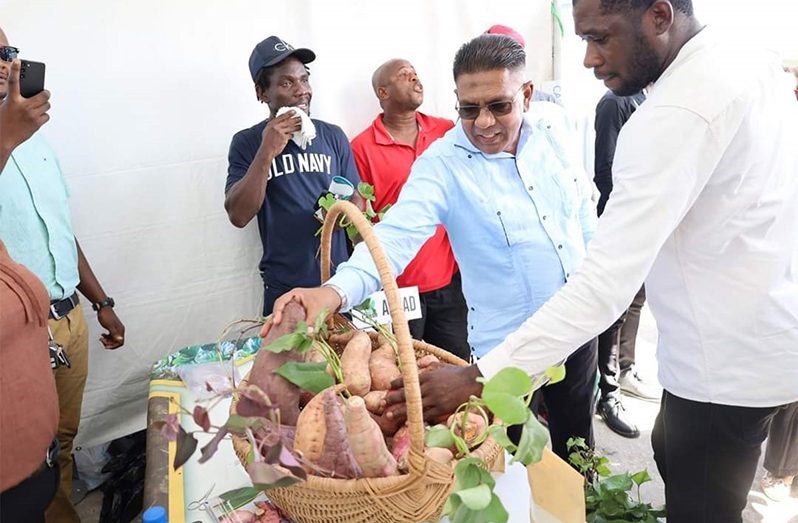–reduce reliance on imports, boost regional trade, Minister Mustapha says
FOCUSED on overcoming the barriers that limit intraregional trade within CARICOM, the Minister of Agriculture, Zulfikar Mustapha, has said that the government is ensuring that the country’s agricultural products can flow freely across the region, reducing the country’s collective reliance on imports.
Minister Mustapha said that the government is committed to modernising and expanding agricultural production through innovation and technology.
It is to this end that he added that the developments in hydroponics and shade house cultivation are intended to increase the production of high-value crops in a controlled environment.
The Agriculture Minister said: “In Guyana today, we have the largest hydroponics farm in the Caribbean, located at Mon Repos.”
Minister Mustapha related that while the government is diligently working to dispel the myth that only mature people, school dropouts, or the less fortunate get involved in agriculture, he is also delighted to share that that concept is changing drastically in Guyana and around the Caribbean.
To encourage the influx of young people into this sector, the Minister mentioned that since the People’s Progressive Party/Civic (PPP/C) gained office in 2020, hundreds of shade houses had been created throughout the country.
According to him, they have also engaged graduates from the University of Guyana (UG) and the Guyana School of Agriculture (GSA) who are employed in fields other than agriculture.
Mustapha said: “His Excellency President Ali has engaged these graduates, and today we have hundreds, if not thousands, of young people who are making a livelihood from agriculture. And that tells a story that with [young people in] agriculture, with food security, and with food production, the future looks very bright.”
Additionally, Minister Mustapha said that this is a critical component of a strategy to reduce Guyana’s food-import bill and achieve self-sufficiency in key areas such as corn and soya.
The Agriculture Minister also said that while he is pleased that they are producing corn and soya, he is optimistic that by 2025, Guyana will be self-sufficient as well as a net exporter in the region for corn and soya beans.
The innovative method, according to him, allows crops to grow efficiently in challenging weather conditions and contributes to food security, not only in Guyana but across the Caribbean.
During his remarks on World Food Day 2024, under the theme “Rights to Food for a Better Life and a Better Future,” Minister Mustapha also highlighted the government’s efforts under President Ali’s leadership, to make Guyana a food-secure nation and a driving force in regional food production.
These two key initiatives, according to Minister Mustapha, are interconnected in their focus on building a sustainable future.
The government has made significant strides, working with both private and public sectors to elevate Guyana’s agricultural prowess and position it as the “food hub of the Caribbean.”
“On this World Food Day, we reaffirm our commitment to ensuring the right to food for all,” Minister Mustapha said, adding: “With strategic investments and partnerships, we can build a future where hunger becomes a thing of the past and food security becomes the foundation of sustainable development.”
He called on stakeholders to continue their support, emphasising the need for collaboration to reduce hunger not only in Guyana but across the Caribbean.
President Ali’s leadership has garnered recognition from CARICOM and international bodies for his dedication to tackling food insecurity.
Vision 25 by 2025 initiative, which seeks to reduce CARICOM’s food-import bill by 25 per cent, is an area in which Guyana has been playing a crucial role.
As other Caribbean nations, traditionally dependent on tourism and oil and gas, turn their focus to agriculture, Guyana is leading the charge in reshaping regional food systems.
Minister Mustapha emphasised that Guyana’s progress in reducing severe food insecurity—currently 25.5 per cent lower than the regional average—was not accidental but the result of deliberate policy measures. These include enhancing food production and improving access to nutritious food across the country.
He also noted the renewed regional interest in agriculture as part of a broader strategy to address food insecurity and reduce dependency on food imports.



.jpg)








